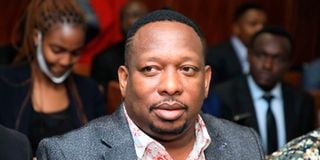Premium
IEBC wants Sonko's new nomination-related petition dismissed

Former Nairobi Governor Mike Mbuvi Sonko.
The electoral agency wants a court to dismiss former Nairobi governor Mike Sonko’s petition challenging its decision to revoke his clearance to run for Mombasa county chief.
Through lawyer Edwin Mukele, the Independent Electoral and Boundaries Commission (IEBC) says Mr Sonko should have taken his complaint to the agency’s Disputes Resolution Committee (DRC), which is still in session.
Mr Mukele told Mombasa High Court Judge John Onyiego yesterday that the DRC is the right forum to adjudicate the dispute.
“The IEBC DRC is in session and the matter should be referred there for resolution,” Mr Mukele told the court during the hearing of Mr Sonko’s application.
Besides the IEBC, Mr Sonko has sued Mombasa County Returning Officer Swalha Ibrahim and the Wiper Democratic Movement while the Ethics and Anti-Corruption Commission (EACC) is an interested party in the case.
The IEBC also argued that Mr Sonko had not sought any order in his petition to have the DRC constituted.
“It cannot be now that the applicant feigns ignorance on the paths he intends to follow. The law does not provide time limits for the resolution of disputes before the declaration of results,” said Mr Mukele.
The decision to revoke the clearance of Mr Sonko, he said, was anchored on the decision of the Supreme Court and that Ms Ibrahim acted within the law in revoking the clearance certificate.
“Based on that finding by the Supreme Court, the applicant (Mr Sonko) was not qualified. The county returning officer and IEBC were complying with the decision of the Supreme Court,” said Mr Mukele.
The electoral agency argued that even if Mr Sonko’s application was to be allowed, it would not be effective as the elections are taking place on Tuesday and ballot boxes for Mombasa have arrived in Kenya.
“Allowing the application will have far-reaching consequences. The interests of the people of Mombasa are paramount to those of the applicant,” Mr Mukele said.
For its part, the EACC, through lawyer Phillip Kagucia, told the court that the IEBC’s decision to revoke Mr Sonko’s clearance complied with the Supreme Court’s decision.
“Once a candidate is impeached, he remains so until the impeachment is set aside,” said Mr Kagucia.
Mr Sonko’s lawyers, led by Mr Ochieng Oginga, told the court that the IEBC decision violated the Fair Administrative Act and the Constitution.
Mr Oginga argued that the decision was made in an opaque manner as there was no notice issued before the revocation nor was Mr Sonko given an opportunity to be heard.
“The decision to revoke the registration (clearance) was irrational, unlawful and unreasonable. The county returning officer has no power to cancel the registration of a candidate,” Mr Oginga said.
Mr Sonko wants the court to quash the IEBC decision.
He argues that Ms Ibrahim and the IEBC made the decision though they knew about his judicial review petition at the Supreme Court and a case he had filed at the East African Court of Justice.
“Despite several correspondences seeking the withdrawal of the letter (of revocation) Ms Ibrahim with the advice of IEBC has neither withdrawn the revocation or gazetted Mr Sonko as a candidate for the elections,” Mr Sonko says in court documents.
Last week, a three-judge bench of the High Court dismissed Mr Sonko’s applications that sought to have the revocation of his clearance quashed and the IEBC and Ms Ibrahim cited for contempt of court.
The judges ruled that their judgment directing the electoral agency to accept Mr Sonko’s nomination papers was based on Article 193 (3) of the Constitution in relation to the existence of his appeal at the Supreme Court challenging his impeachment.
Because the Supreme Court had dismissed Mr Sonko’s appeal, they said, his rights to exhaust all avenues of appeal had been extinguished and thus their judgment was not applicable at the moment.
A ruling will be delivered on Monday next week.





